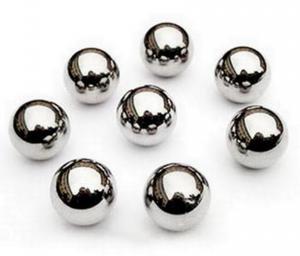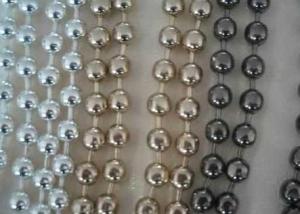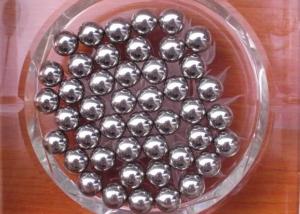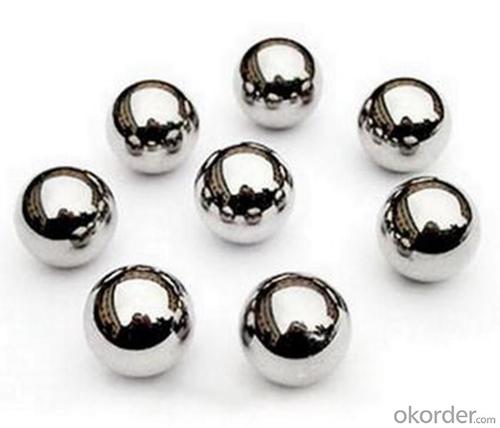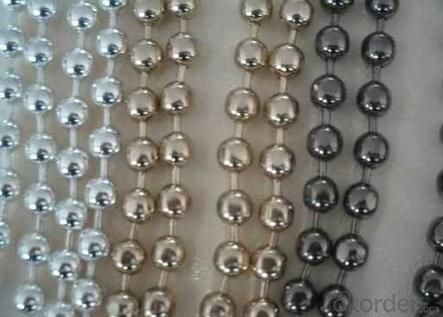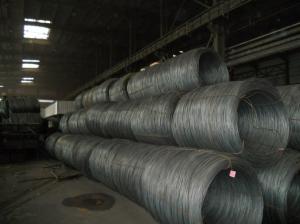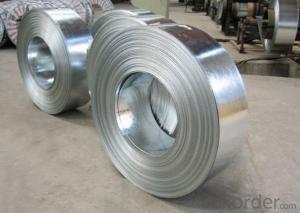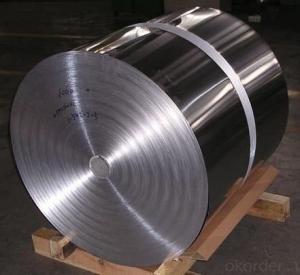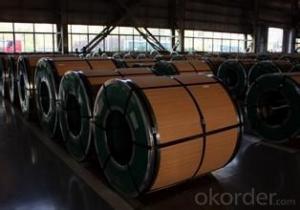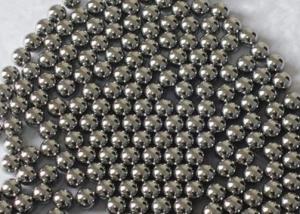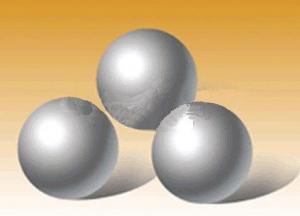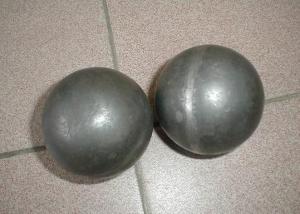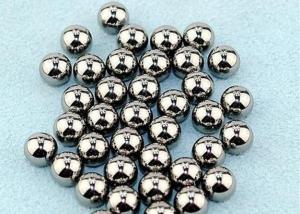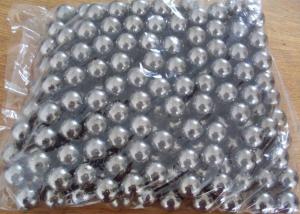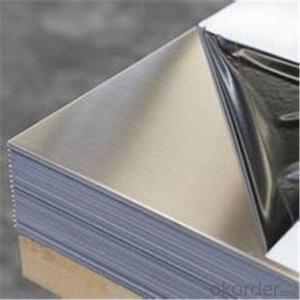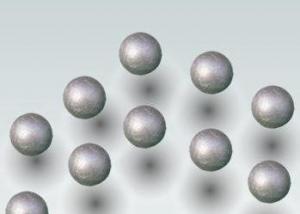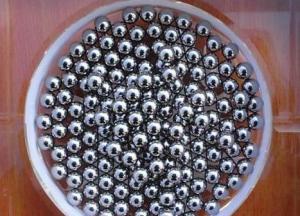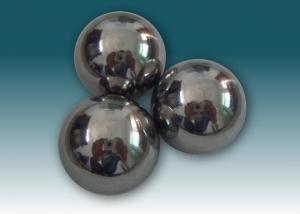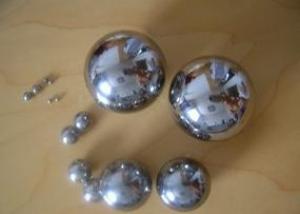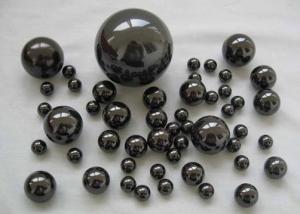304 Stainless Steel Balls
- Loading Port:
- Tianjin Port
- Payment Terms:
- TT or LC
- Min Order Qty:
- 1 Ton pc
- Supply Capability:
- 500 Tons Per Month pc/month
OKorder Service Pledge
OKorder Financial Service
You Might Also Like
Main Products Of 304 Stainless Steel Ball:
1. Material: AISI304, 316L, 420C, 430, 440C
2. Steel ball, with material AISI 1008-1086.
3. Chrome steel ball,with material: AISI52100
4. Flying saucer steel ball
5. Precision casting, including auto parts, machine parts, hardware handles, etc.
Character Of 304 Stainless Steel Ball:
1.The Grade of our products is from G10 to G1000
2.The dimension is from 0.5 mm to 25.4 mm.
3.The products from us are widely used in several industries, such as hardware, sliders, ball bearing lead screw, wheels, toys, bicycles, bearings, trust bearings pulleys, chemical industries, etc.
Detail Specification Of 304 Stainless Steel Ball:
Item | SS304,316L,420C,440C Stainless steel ball |
Category | Stainless Steel Ball |
Material | AISI 420 430 440 SS304 316L |
Size | 0.5mm--25.4mm, 1/4",3/16",5/32",1/8",7/32",5/16",7/8",1" |
Grade | G100-G3000 |
Hardness ( HRC) | HRC58-65 |
Application | Bicycle, bearing, pulley, slide, handcraft, shelf, luggage, hardware, grinding media |
Standard | GB/T-308-2002, GB/T1148-93 |
Matched Standard | DIN, JIS, ASME |
Certification | ISO |
Packing | Oily packing in pouch packing,plastic/tin box packing 1, 25kg/carton with steel pallet packing 2,25kg/carton without steel pallet packing 3,10kg/box then in wooden case packing 4,250kg/ steel drum packing or according to customers' requirement |
Place of original | Shandong province, China |
Delivery | Within 30 days or confirmed while placing order |
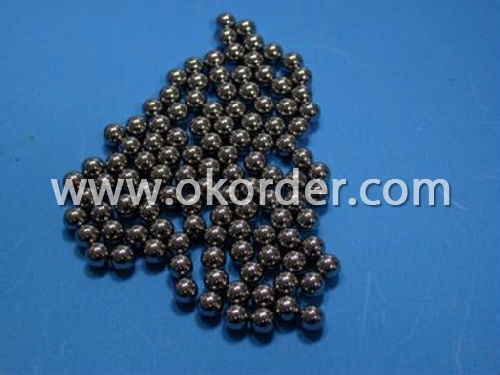
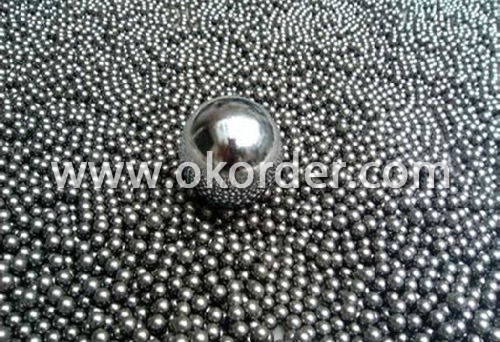
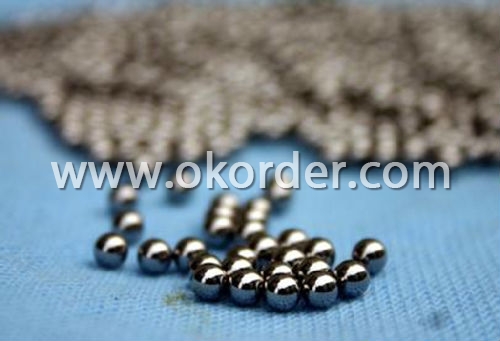
- Q: How do you calculate the friction or rolling resistance of stainless steel balls?
- To calculate the friction or rolling resistance of stainless steel balls, several factors need to be taken into consideration. Firstly, the coefficient of friction between the stainless steel ball and the surface it is rolling on needs to be determined. This coefficient represents the amount of force required to overcome friction and is typically measured experimentally. It can vary depending on the type of surface, lubrication present, and other factors. Secondly, the weight or load applied to the stainless steel ball must be known. The rolling resistance is influenced by the load on the ball, with higher loads resulting in higher rolling resistance. Next, the diameter of the stainless steel ball is important. The rolling resistance is inversely proportional to the radius of the ball, meaning that smaller balls will generally experience higher rolling resistance compared to larger ones. Lastly, the speed at which the stainless steel ball is rolling should be considered. Rolling resistance may increase with higher speeds due to factors such as air resistance. Putting all these factors together, the rolling resistance of stainless steel balls can be calculated using equations or formulas that take into account the coefficient of friction, load, diameter, and speed. It is important to note that these calculations are typically an estimation and may not perfectly reflect real-world conditions. Therefore, experimental testing is often necessary to validate the calculated values.
- Q: How do stainless steel balls perform in high-precision applications?
- Stainless steel balls perform exceptionally well in high-precision applications due to their corrosion resistance, durability, and precise dimensional accuracy. Their smooth surface finish and high hardness make them ideal for use in precision bearings, valves, measurement instruments, and other critical applications where accuracy and reliability are crucial.
- Q: Are stainless steel balls typically used in ball bearings?
- Yes, stainless steel balls are commonly used in ball bearings. Stainless steel is a durable and corrosion-resistant material that is well-suited for applications where the bearing may be exposed to moisture or harsh environmental conditions. The smooth surface finish of stainless steel balls also helps to reduce friction and ensure smooth rotation within the bearing. Additionally, stainless steel balls are available in various grades and sizes, allowing for customized solutions to meet different bearing requirements.
- Q: Can stainless steel balls be used in high-temperature applications?
- Yes, stainless steel balls can be used in high-temperature applications. Stainless steel is known for its excellent heat resistance properties, making it suitable for use in elevated temperature environments. The specific grade of stainless steel used will depend on the application and the required temperature resistance. For extremely high-temperature applications, materials like 316 stainless steel or other heat-resistant alloys may be used. These stainless steel balls can withstand elevated temperatures without losing their structural integrity or dimensional stability. However, it is important to consider other factors such as corrosion resistance, load-bearing capacity, and lubrication requirements when selecting stainless steel balls for high-temperature applications.
- Q: How do you clean and disinfect stainless steel balls?
- To clean and disinfect stainless steel balls, you can start by wiping them down with a damp cloth or sponge soaked in warm soapy water. Gently scrub the surface to remove any dirt or grime. Afterward, rinse the balls with clean water and use a microfiber cloth to dry them thoroughly. To disinfect, you can either use a solution of equal parts water and rubbing alcohol or a mixture of water and vinegar. Apply the solution to the balls, let it sit for a few minutes, and then wipe it off with a clean cloth. Finally, rinse the balls again with water and dry them completely before use.
- Q: Are stainless steel balls used in pressure relief valves?
- Yes, stainless steel balls are commonly used in pressure relief valves. Stainless steel is a preferred material for pressure relief valves due to its corrosion resistance, strength, and durability. The use of stainless steel balls in these valves ensures reliable and long-lasting performance, as they can withstand high pressures and harsh environments. Additionally, stainless steel balls provide excellent sealing properties, which is crucial for maintaining the integrity of the pressure relief valve and preventing any leaks. Therefore, stainless steel balls are an integral component of pressure relief valves and contribute to their overall effectiveness in protecting equipment and systems from excessive pressure.
- Q: Are stainless steel balls used in any packaging machinery?
- Stainless steel balls find widespread use in packaging machinery. They serve multiple purposes in the machinery, including conveyor belts, ball bearings, and rotary tables. The preference for stainless steel balls in packaging machinery stems from their exceptional durability, resistance to corrosion, and ability to bear heavy loads and high speeds. Their presence ensures seamless movement and efficient functioning of the machinery, thereby enhancing productivity and dependability. Moreover, stainless steel balls also contribute to specific packaging processes, such as mixing and blending, by effectively agitating and blending materials. In summary, the packaging industry heavily relies on stainless steel balls to ensure the smooth and dependable operation of packaging machinery.
- Q: How do stainless steel balls compare to chrome steel balls?
- Stainless steel balls and chrome steel balls are both commonly used in various industries, but they have some key differences in terms of material composition and properties. Stainless steel balls are made from an alloy of steel mixed with chromium and other elements such as nickel and molybdenum. This alloy gives stainless steel balls excellent corrosion resistance, making them ideal for applications where they may come into contact with moisture or chemicals. They are also known for their high strength, durability, and low magnetic properties. Stainless steel balls are widely used in industries such as aerospace, automotive, medical, and food processing, where their corrosion resistance and hygienic properties are crucial. On the other hand, chrome steel balls, also known as bearing balls, are made from a high carbon steel alloy that contains chromium. The addition of chromium improves the hardness and wear resistance of the balls, making them suitable for use in bearings, valves, and other mechanical applications. Chrome steel balls are known for their excellent surface finish and dimensional accuracy, making them ideal for precision applications. They are also magnetic and have good toughness, which allows them to withstand high impact and load conditions. In terms of pricing, stainless steel balls are generally more expensive than chrome steel balls due to the additional alloying elements and the higher cost of production. However, the specific requirements of the application and the desired properties of the balls should determine the choice between stainless steel balls and chrome steel balls. In summary, stainless steel balls offer superior corrosion resistance and non-magnetic properties, making them suitable for applications where durability and hygienic properties are essential. Chrome steel balls, on the other hand, excel in hardness, wear resistance, and dimensional accuracy, making them ideal for precision mechanical applications.
- Q: Are stainless steel balls resistant to bacterial growth or contamination?
- Indeed, bacterial growth and contamination are effectively resisted by stainless steel balls. Being a non-porous material, stainless steel creates an unsuitable habitat for bacteria to flourish. Its sleek surface facilitates effortless cleaning and prevents bacteria from adhering onto it. Furthermore, stainless steel's exceptional resistance to corrosion acts as an additional deterrent to bacterial growth. Consequently, stainless steel balls prove to be a sanitary option for a multitude of applications, particularly in sectors like the food and beverage industry or medical settings, where bacterial contamination is a primary concern.
- Q: Are stainless steel balls resistant to UV radiation?
- Indeed, stainless steel balls typically exhibit a high level of resistance towards UV radiation. Stainless steel is renowned for its ability to withstand corrosion and maintain durability, making it exceptionally resistant to UV radiation as well. The presence of chromium within stainless steel is responsible for generating a safeguarding oxide layer on its surface, serving to safeguard the material from harm caused by UV rays. This protective layer functions as a barrier, successfully shielding the stainless steel from detrimental UV radiation and averting any degradation or discoloration over time. Consequently, stainless steel balls can be regarded as a fitting option for scenarios that demand UV resistance.
1. Manufacturer Overview
| Location | Guangzhou,China |
| Year Established | 2001 |
| Annual Output Value | Above US$0.5 Million |
| Main Markets | Southeast Asia, Europe |
| Company Certifications | ISO 9001:2008; |
2. Manufacturer Certificates
| a) Certification Name | |
| Range | |
| Reference | |
| Validity Period |
3. Manufacturer Capability
| a) Trade Capacity | |
| Nearest Port | Shanghai |
| Export Percentage | 30% |
| No.of Employees in Trade Department | 10 People |
| Language Spoken: | English;Chinese |
| b) Factory Information | |
| Factory Size: | Above 30,000 square meters |
| No. of Production Lines | Above 7 |
| Contract Manufacturing | OEM Service Offered;Design Service Offered |
| Product Price Range | Average |
Send your message to us
304 Stainless Steel Balls
- Loading Port:
- Tianjin Port
- Payment Terms:
- TT or LC
- Min Order Qty:
- 1 Ton pc
- Supply Capability:
- 500 Tons Per Month pc/month
OKorder Service Pledge
OKorder Financial Service
Similar products
Hot products
Hot Searches
Related keywords
